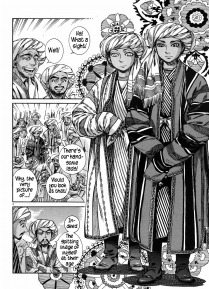 |
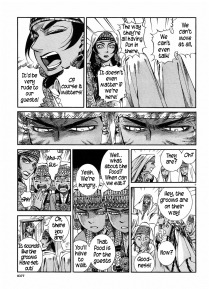 |
 |
“The Feast – Part II”
Or, “Saahm and Sahmi are screwed”. Seriously, you can’t help but feel for these poor kids – they’re going to have a trying married life trying to keep up with Laila and Leyli. The twins are cute and all, but a more selfish and spoiled pair of hellions you’ll be hard-pressed to find.
That brings us to one of the striking things about this chapter. It’s an inescapable fact in reading these pages that all of the principals are children, and as I’ve said before, Mori-sensei is really treading on ground that could be dangerous in less skilled hands. The four of them are about to be married, yet all (especially the girls) seem utterly innocent to the journey they’re about to undertake. It’s all about food, and boredom, and restlessness, this big day of theirs. But in this time and this place, this is when people got married – at 13 or 14 years old. It wasn’t just a custom, it was a necessity.
 |
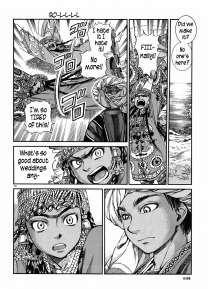 |
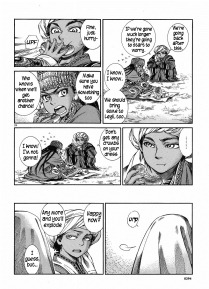 |
One thing that’s clear here: as it is today, weddings are more for the families than the brides and grooms. As the girls sit under their mother’s watchful eye, tortured by the smells of delicious food and the sounds of merriment, Saahm and Sahmi are paraded around the village in their wedding finery like a pair of prized livestock. The families and friends coo and gasp over them, and the men all have words of advice that mostly go over their heads. As for the boys themselves, they’re just embarrassed more than anything – one gets the sense they’d rather be just about anywhere than where they are.
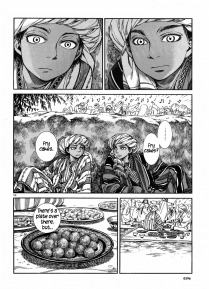 |
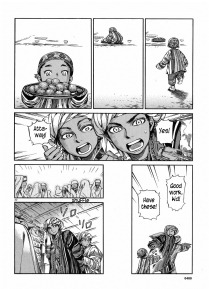 |
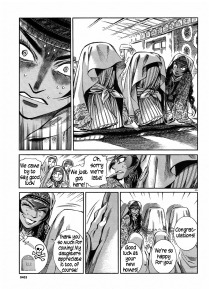 |
As always with Mori, what comes through is the commonality of human emotions – even in this remote setting of time and place, everyone is instantly recognizable, because they feel the same things we feel. The boys are uncomfortable at being the center of attention, and when the girls rope them into being errand boys, sneaking them food and in Laila’s case, sneaking her out of her tent, Sahmi particularly feels resentful at the unfairness of it. After all, he’s running around like crazy, sneaking food off tables (or conning the twins’ baby brother into doing it), and it’s all for Leyli’s sake. The older brother sternly reminds him that it isn’t about being fair, and that “keeping score” is not the right way to look at a marriage. That will be advice the younger Sahmi would be well-served to remember as the years pass.
Any way you slice it, the feeling is that these are children playing house, not adults about to be married – yet, married they are about to be. The feeling in these pairings is nothing like that of Amira and Karluk – oddly enough, though there’s a large age difference, the two of them feel much more like a true couple. There’s certainly a much deeper connection between them, and a truer sense of mutual love – there’s certainly no chance that the twins and the brothers love each other yet, or really even understand what that means. As is the nature of arranged marriage, love is something the relationship will either grow into or it won’t – and this just serves to prove how very lucky Karluk and Amira are. In spite of their age difference deferring some aspects of their relationship, they already have the hard part – mutual devotion – down pat.
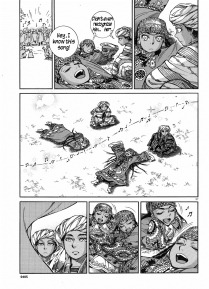 |
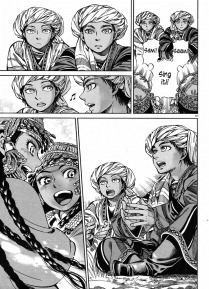 |
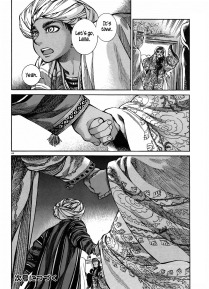 |


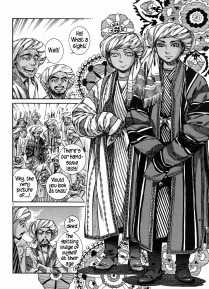


Arabesque
September 5, 2012 at 4:43 pm''Mori-sensei is really treading on ground that could be dangerous in less skilled hands. The four of them are about to be married, yet all (especially the girls) seem utterly innocent to the journey they’re about to undertake. It’s all about food, and boredom, and restlessness, this big day of theirs. But in this time and this place, this is when people got married – at 13 or 14 years old. It wasn’t just a custom, it was a necessity.''
And that's pretty much it. The reason why Mori-sensei is handling this so well is because she isn't fetishizing it, but treating the subject in a matter-of-fact manner within the context of the story.
I mean, as you pointed out, they are getting married this early because it is a necessity. We had seen early on in volume one how people used to comment on Amir being too old (when she is 20 …) because she wouldn't be able to have as many children, and in those times, back when people used to die all the time and with little reason (see Tarasu 5 husbands, when Karluk got ill). Credit must be given for her fine handling of the subject, but her decision for the setting helped her tremendously.
elianthos
September 7, 2012 at 1:31 pmIndeed, those two are a handful. Good luck with them, dear boys :,).
I think the whole young age arrianged marriage deal is relatively easy for us to swallow not only thanks to Mori's ability and humanity but also because it happens outside of our culture. We can suspend our judgement because Mori herself is non-judgemental. We are close the the souls of the characters because she makes those characters relatable, while some specific facets of their culture are comfortably far and removed from our perceived standards of normalcy.
That said… while those 'exotic' costume and customs are fascinating to watch, I've never been fond of huge marriage ceremonies even in my own culture where everything should be adorned in white and flowers and a crowning achievement of official love. The feeling of being a tool and a cog in the machine… As a child those long ceremonies bored me out my mind – especially as I was always picked to be the valet spreading flowers or carrying the rings basket and stuff. Always in the spotlight as the couple's accessory ans being pinched all the time. Excruciating – , as an adult I found them – much like stated in this chapter of Otoyomegatari – 'made not for the couple' but for the families to show off. Often involving people pretending to be happy and friendly. In my experience a social glue fed by a giant amount of hypocrisy most of the times unfortunately ^^; .
I'd like my marriage – if any – to be private and quick, thank you very much XD.
At least the twins' whims eventually led brides and grooms to have a bit of private time dancing and singing together to actually *enjoy* some of the celebrations *for themselves*…
—
I wonder if the next chaoter will still focus on these brides and grooms or if we'll go back to Amir and Karluk – and Tarasu – anytime soon. While I did enjoy this arc for its slice of life goodness I'm really starting to miss them now.